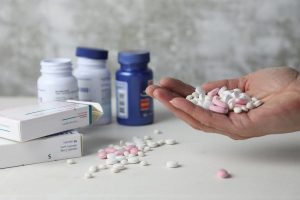Precursors and other raw materials for drugs
Publication date 28-02-2025, 11:32 | Last update 28-02-2025, 11:32
Everyday chemicals can be used for making prohibited drugs. To prevent abuse, the FIOD investigates unusual transactions involving chemicals both within the Netherlands and abroad.

Raw materials for drugs
For the production of synthetic drugs, various chemicals are required.
- precursors: substances that turn into drugs in a chemical reaction. For example, BMK (benzylmethylketone) and PMK (piperonylmethylketone), are the main raw materials for amphetamine and MDMA (ecstasy).
- pre-precursors: substances that can be converted into precursors. Many pre-precursors have no legal applications but were developed to circumvent legislation.
- Other substances indispensable for drug production such as solvents (e.g. acetone) and catalysts.
Legal use
Some of the chemicals used for drugs also have legal applications. For example. for making medicines, cosmetics or plastics. For that reason, the trade in these substances cannot be banned completely. However, there is a list of substances that can only be traded with a licence, otherwise you can be punished. That list is included in the Abuse of Chemical Substances (Prevention) Act (Wvmc).
What is the task of the FIOD?
The FIOD enforces the Wvmc (together with Customs). The FIOD works together with other authorities to investigate the trade and use of raw materials for drugs. Such as the National Police and the Public Prosecution Service (OM). For example, when the FIOD receives a report about a suspicious cargo, we search for evidence that the substances are meant for the production of illegal substances.
Reporting suspicious situations with chemicals
Report suspicious situations with chemicals to the Centre for Reporting Suspicious Transactions Chemicals:
- preferably by email: precursoren@belastingdienst.nl
- in case of emergency (if the chemicals can also be used for explosives) by telephone: 088 154 00 00
Please provide as much information about the situation and suspicious person as possible. Such as:
- type of chemical
- quantity
- email, telephone and personal details
- any external features
Reporting obligation
Market participants such as manufacturers, retailers and other entrepreneurs are obligated to report suspicious situations involving certain chemicals.
Examples:
- theft of chemicals
- unusual orders
- unusual delivery addresses
- suspicious requests and orders
The list of registered substances subject to the reporting obligation is contained in European regulations the Wvmc refers to: (EC) no. 273/2004 and (EC) no.111/2005.
